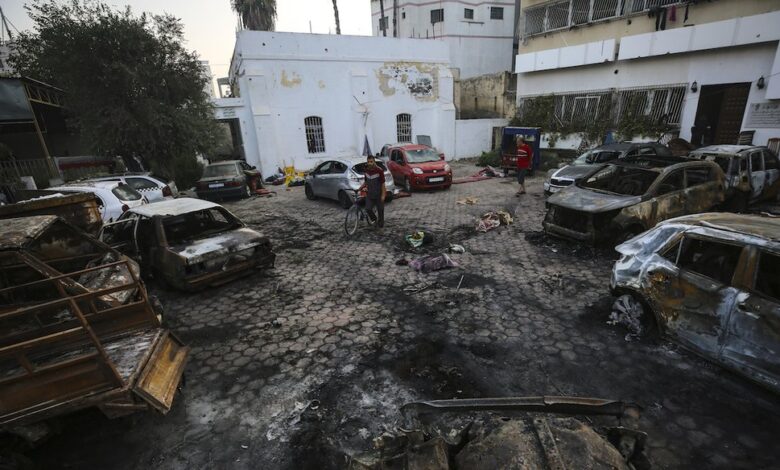PM Modi Expresses Condolences for Gaza Hospital Deaths in Call with Abbas, Reaffirms India’s Position on Israel-Palestine Issue and Pledges Humanitarian Aid

Prime Minister Narendra Modi spoke to Palestinian President Mahmoud Abbas on Thursday, their first phone call since the October 7 Hamas attack on Israel and the retaliatory Israeli strikes that have sent tensions soaring across West Asia, to express condolences over the loss of civilian lives at the Al Ahli Hospital in Gaza City.
India’s “long-standing principled position on the Israel-Palestine issue” was reaffirmed by the Prime Minister.
Spoke to the President of the Palestinian Authority H.E. Mahmoud Abbas. Conveyed my condolences at the loss of civilian lives at the Al Ahli Hospital in Gaza. We will continue to send humanitarian assistance for the Palestinian people. Shared our deep concern at the terrorism,…
— Narendra Modi (@narendramodi) October 19, 2023
“I spoke with H.E. Mahmoud Abbas, President of the Palestinian Authority.” My condolences for the loss of civilian lives in Gaza’s Al Ahli Hospital. We will continue to provide humanitarian aid to the Palestinian people. We expressed our great worry over the region’s terrorism, violence, and deteriorating security situation. In a post on X, Modi reaffirmed India’s long-standing principled approach on the Israel-Palestine conflict.
Palestinians blamed an Israeli missile strike for the deaths at Al Ahli Hospital, but Israel claimed that a Palestinian Islamic Jihad rocket misfired and fell on the hospital, inflicting injuries.
Modi had responded to the Gaza hospital incident the day before. “Deeply shocked by the tragic loss of life at Gaza’s Al Ahli Hospital.” Our sincere condolences to the deceased’ families, and wishes for the quick recovery of those injured.”
“Civilian casualties in the ongoing conflict are a serious and ongoing source of concern.” “Those responsible should be held accountable,” he stated in a post on X, which was interpreted as a message to both Israel and Hamas.
His remarks were consistent with the earlier statement by the Ministry of External Affairs, whose spokesperson Arindam Bagchi stated that there is a universal obligation to observe international humanitarian law, as well as a global responsibility to combat terrorism in all of its forms and manifestations.
Modi’s call to Abbas comes only days after he expressed support with Israeli Prime Minister Benjamin Netanyahu. On October 10, Modi thanked Netanyahu “for his phone call and providing an update on the current situation,” adding that “the people of India stand in solidarity with Israel in this difficult hour.”
He went on to say “India strongly and unequivocally condemns terrorism in all its forms and manifestations” .
Later, in its first public remark on the Israel-Hamas conflict, Delhi attempted to strike a compromise. “We have strongly condemned the horrific terrorist attack on Israel,” MEA spokesperson Bagchi said during a weekly briefing. “We believe the international community must stand together in combating terrorism in all its forms and manifestations.”
“As regards Palestine, we have reiterated our long standing position of advocating the resumption of direct negotiations towards establishing a sovereign, independent and viable State of Palestine living within secure and recognised borders, side by side at peace with Israel,” he went on to say.
“We have also expressed concern about civilian casualties as a result of the ongoing conflict.” We remain concerned about the humanitarian situation as well. We would encourage full and uncompromising adherence to international humanitarian law.”
The phone call to Abbas on Thursday is seen as a balancing act, with the phrase “universal obligation to observe international humanitarian law” aimed at both Israel, which has been conducting aerial strikes in Gaza, and Hamas, which has killed Israeli civilians including women, children, and the elderly.
The diplomatic difficulty for Delhi was to strike a balance between the different parties in West Asia where India has deep strategic relations with Israel on the one hand and Saudi, UAE, Qatar, Iran, and Egypt, to name a few.



